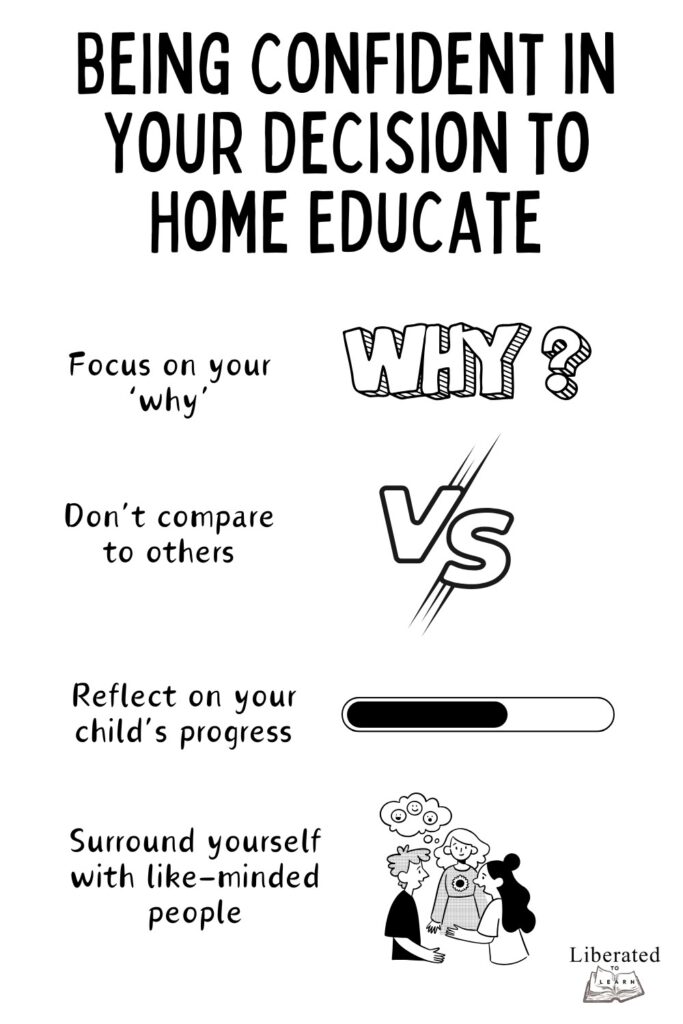In this post, we’re diving into the stigma of home education, the concerns that people may have that then lead to judgement and criticism, and ways we can handle judgement about home education.

Home education is a personal choice, and it’s one that many families take a lot of time in considering and making sure that it’s right. But with our decision to home educate, comes a lot of misunderstanding, judgement, and criticism from other people.
Let’s be honest, it’s not always easy to deal with. I dread having to explain myself when someone asks why I’m home educating or how my daughter socialises or the endless doubts that they then bring up. And it doesn’t matter whether it’s someone I know or a complete stranger—it still leaves the same deflated feeling inside.
The truth is, judgement is something we all face, but we don’t have to let negativity shake our confidence, especially about home educating. In this post, we’re diving into the stigma of home education, the concerns that people may have that then lead to judgement and criticism, and ways we can handle judgement about home education.

Why Do People Judge or Criticise Home Education?
It’s difficult when people judge and criticise, but it’s reality. We wouldn’t be human if we didn’t do it or experience it from time to time. But the reason why people judge or criticise home education—or anything for that matter—is because they do not fully understand it.
It might be a concept that is new or foreign to some people. It might be that they themselves have had a negative experience with home education. It might be that they have always been led to believe the misconceptions about home education and that school is the norm.
There will always be reasons for and against home education vs. school—it’s inevitable because people will have better experiences and knowledge of either one or the other. The reason for any judgement or criticism comes from a lack of understanding, and it’s not until people are made aware of things, or experience them, that the picture becomes clearer and judgement turns to understanding.
Common Concerns About Home Education
To better understand why some people may judge us for choosing to home educate, let’s look at the common concerns about home education and the myths that people believe.
Socialisation
The biggest concern, but also the biggest misconception, about home education is that home educated children do not get enough socialisation and therefore lack socialisation skills. As home educators, we know this couldn’t be further from the truth because we know how many social opportunities are out there and how much valuable interaction our children are getting every day.
There are a few reasons why people who don’t home educate usually worry about socialisation:
- They believe school is the best setting for socialisation and making friends.
- They think home education involves a lot of time indoors and that home educated children are ‘sheltered.’
- They think home educated children may struggle more with social challenges and lack resilience.
- They misunderstand the scope of home education activities and groups.
Future prospects
Another misconception that people have is that home educated children will struggle with future prospects like college and work. The question that usually arises is, “Will they be able to get into college or find a job?”
The truth is, home educators are more than capable of preparing their children for higher education and a career. Home educated children have the option of taking exams, and there are so many resources out there to support home educating families.
Receiving a quality education
People often judge that the quality of home education couldn’t possibly compare to the education that children receive in school. The misconception is that parents aren’t well-equipped or ‘qualified’ to teach their children, but we know you don’t need to take on the role of ‘teacher’ to provide your children with a good education.
The quality comes in the experiences we provide and the discoveries our children make.
Being Confident in Your Decision to Home Educate
When we receive judgement or criticism, it’s hard—there’s no doubt about that. But it’s important to be confident in our decision to home educate and remember our ‘why.’ Here are some tips to help you remain confident about home educating:
- Focus on your ‘why’: Why did you decide to home educate in the first place? Reflect on your reasons and remind yourself of your motivations.
- Reflect on your child’s progress: When those doubts start to set in, take a step back and reflect on your child’s progress. It will open your eyes to how well they’re doing and how far they’ve come.
- Don’t compare: Comparing yourself or your child to others can easily diminish your confidence. Just remember that everyone is on their own journey, regardless of whether they home educate or not. What works for others won’t necessarily work for you. Be confident in following your own journey.
- Surround yourself with like-minded people: One of the best ways to stay confident in your decision to home educate is by surrounding yourself with people who are doing exactly the same and who have the same values as you.

Handling Judgement About Home Education
Whilst you won’t be able to prevent people judging and criticising your decision to home educate, there are ways to handle it better. Either way, receiving judgement from friends and family or receiving judgement from strangers isn’t great, but it can feel different.

Judgement From Friends and Family
Of course, receiving judgement from friends and family is particularly challenging because it’s personal and from people whose opinions we usually value. I’ve found that these are the easiest ways to deal with judgement from those that are closest to us.
1. Be prepared with your responses
If you know that your friends and family feel a certain way about home education, you can prepare yourself with responses that defend your choice. Responding with facts and personal experiences makes it harder for someone to question you, and you’ll feel a lot better about backing your own corner.
2. Don’t take comments to heart
It’s easier said than done, but try not to take certain comments to heart. If you find yourself feeling affected, mentally step back and think, will this opinion actually change my mind? Do I care enough? Remember, other people’s opinions shouldn’t sway your decisions.
3. If you don’t agree, ignore it
This one is pretty simple. If you don’t agree with an opinion or something that’s been said, simply ignore it. This doesn’t mean ignoring the person but instead not entertaining their comment or making a bigger deal out of it.
4. Set boundaries
No matter how close you are to someone, it’s sometimes important to set boundaries. If certain individuals are consistently negative, limit conversations about home education with them. Politely but firmly express that your choice is not up for debate.
5. Involve them
To help your friends and family better understand why you home educate, involve them in the process. This could be anything from simply sharing progress updates or inviting them to home education groups and activities. Sometimes, seeing home education in action can help to ease concerns.
Responding to Negative Comments in Public
When strangers feel the need to comment on home education, it can be surprising or catch us off-guard. When faced with unsolicited criticism, consider:
- A polite but firm response: “Thanks for your concern, but home education has been a great fit for our family.”
- Humour as a tool: “Oh, we actually home educate on Mars—socialisation is a bit different there!” Humour can diffuse tension and show that you’re confident in your choice.
- Choosing to disengage: Not every comment needs a response. If someone is unwilling to listen, it’s okay to move on. Your energy is better spent on your child’s education than defending yourself to strangers.
- Redirecting the conversation: If someone brings up a misconception, counter it with a question: “That’s interesting! What do you think is the most important aspect of education?” This can encourage productive discussions rather than awkward disagreements.
Finding a Supportive Home Education Community
When home educating, it’s important to find support, especially if you struggle with judgement and criticism. Surrounding yourself with like-minded families can make a world of difference. The best ways to find support are:
- Local home education groups
- Online forums and social media
- Home education events
- Home education blogs
Educating Others About Home Education
As judgement often comes from misinformation and a lack of understanding, it’s a good idea to educate others about home education when the right opportunity arises. Here are some ideas on how you can educate others about home education and its benefits:
- Share success stories: Talk about well-known home educated individuals or personal examples of success.
- Provide resources: If someone is genuinely interested, direct them to books, studies, or websites about home education. Offering educational material can help shift their perspective.
- Lead by example: Simply demonstrating the positive outcomes of home education can change perceptions over time. Confidently living your home education lifestyle will speak volumes.
Overview
Your confidence doesn’t have to be shaken by judgement and criticism. Your choice to home educate is a deeply personal one, and only you know what’s best for your family. By understanding concerns, setting boundaries, and finding a support system, you can navigate criticism with ease.
Remember, the most important thing is your child’s well-being and education—not the opinions of others. Stay confident, trust your instincts, and focus on the incredible learning journey you’re providing for your child.
Have you faced judgment about home education? How do you handle it? Share your experiences in the comments!

m@liberated
Want more from Liberated to Learn?
Subscribe to stay updated about new posts, resources and giveaways!












